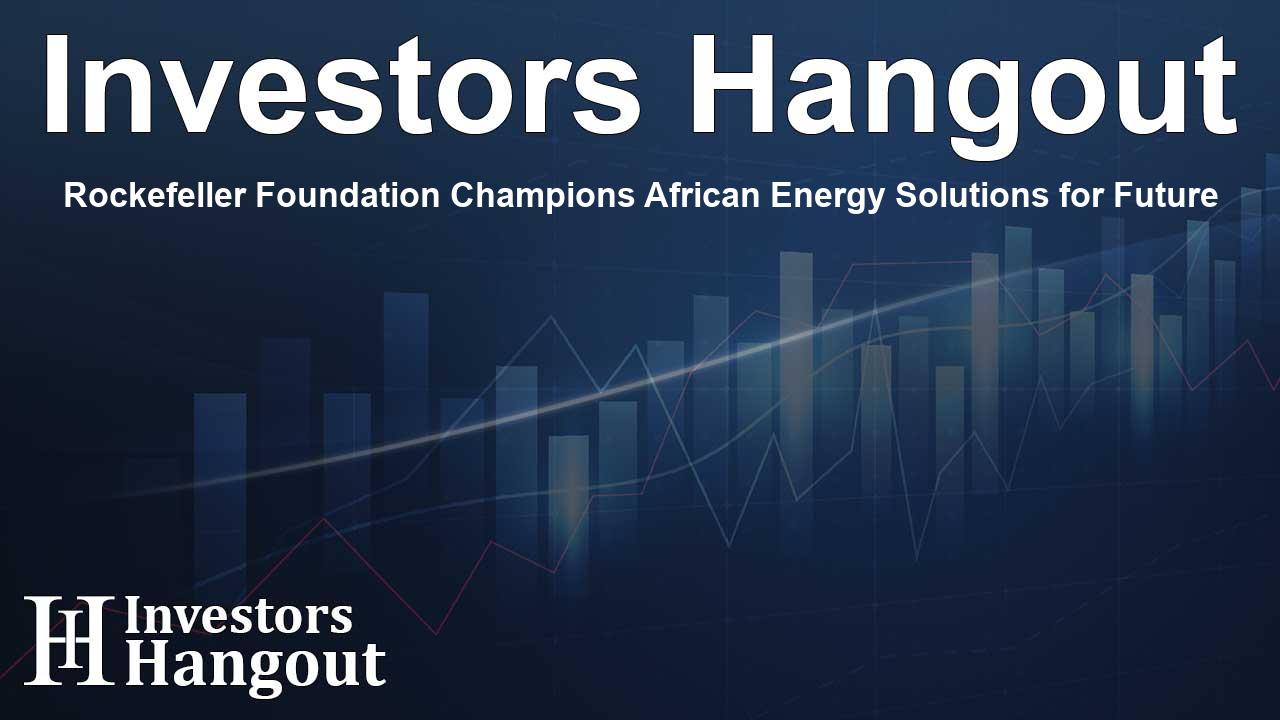Rockefeller Foundation Champions African Energy Solutions for Future

Advancing Energy Transition in Africa
The Rockefeller Foundation is taking significant steps to promote clean energy solutions on the African continent. Recently, they announced plans to contribute $10.9 million for various projects aimed at energy transition, building on previous commitments totaling $10 million through the Mission 300 TA Accelerator program. This ambitious funding is directed to organizations like the African Climate Foundation and the Clean Cooking Alliance, which aim to empower local communities and improve energy access.
Innovative Energy Initiatives
One of the key initiatives is the creation of the African Energy Futures Initiative (AEFI), which will receive a $2.1 million grant to support African-led energy projects. The AEFI focuses on establishing centers of excellence in energy systems modeling and analysis, equipped to develop tailored solutions for local communities. This approach underscores the foundation’s commitment to fostering indigenous capacities and knowledge in managing energy resources.
Clean Cooking Solutions
A significant portion of the funding will also be allocated to launching the inaugural Clean Cooking Delivery Unit aimed at improving cooking solutions in Kenya. This initiative seeks to address the pressing issue of clean cooking access, as many households rely on harmful fuels. By establishing a network of Clean Cooking Delivery Units, the foundation intends to promote efficient cooking technologies and reduce reliance on polluting fuels.
Supporting Education and Regulation
The Rockefeller Foundation aims to enhance energy education through its support for the African School of Regulation (ASR). With a $3 million commitment, the ASR will serve as a hub for energy policy and regulation training, aiming to promote sustainable practices across the continent. This initiative highlights the importance of developing regulatory frameworks that facilitate energy access for all.
Integrating Solar Energy Solutions
In addition to its educational initiatives, the foundation is working with partners to integrate off-grid solar solutions within national electrification strategies. With a $300,000 grant, they aim to assist various African nations in designing strategies that promote the use of solar energy to provide affordable energy access. The focus is not only on addressing current energy gaps but also ensuring long-term sustainability and resilience.
Mini Grid Projects in Zambia
A crucial initiative includes a $5 million commitment to support Zambia's plan for deploying over 1,000 mini grids in rural areas. By collaborating with organizations like Sustainable Energy for All (SEforALL), the foundation aims to enhance energy access while stimulating local economies through distributed renewable energy technology.
Commitment to Local Energy Solutions
William Asiko, Vice President at the Rockefeller Foundation, emphasized that Africa's leadership is vital for a sustainable energy future. He stated, "From mini grids to clean cooking solutions, our partnership with African leaders aims to scale innovative approaches that transform lives.” This sentiment reflects a broader understanding that local solutions often drive the most substantial change.
Community and Economic Growth
Moreover, Sarah Malm, Executive Director of GOGLA, noted that access to clean renewable energy is foundational for economic growth and resilience. By prioritizing energy access through initiatives that reach the hardest-to-reach populations, they aim to build the political and technical capacity of governments, hence supporting significant advancements in energy access.
Frequently Asked Questions
What is the primary goal of the Rockefeller Foundation's funding in Africa?
The foundation aims to promote clean energy solutions and improve energy access across various African nations through targeted funding initiatives.
How will the African Energy Futures Initiative (AEFI) contribute to local communities?
AEFI will support projects that build local capacity in energy systems modeling and analysis, empowering communities to develop tailored energy solutions.
What role does the African School of Regulation (ASR) play in the energy transition?
ASR focuses on energy policy and regulatory training, aiming to promote sustainable and affordable energy access through enhancing the legal and regulatory framework in Africa.
Why is clean cooking a priority for the foundation's initiatives?
Clean cooking initiatives are essential as millions of people in Africa rely on harmful fuels. Improving access to clean cooking solutions addresses significant health and environmental issues.
What impact will the mini-grid projects have in Zambia?
The mini-grid projects aim to enhance energy access in rural communities, stimulating local economies and providing electricity to previously underserved populations.
About Investors Hangout
Investors Hangout is a leading online stock forum for financial discussion and learning, offering a wide range of free tools and resources. It draws in traders of all levels, who exchange market knowledge, investigate trading tactics, and keep an eye on industry developments in real time. Featuring financial articles, stock message boards, quotes, charts, company profiles, and live news updates. Through cooperative learning and a wealth of informational resources, it helps users from novices creating their first portfolios to experts honing their techniques. Join Investors Hangout today: https://investorshangout.com/
Disclaimer: The content of this article is solely for general informational purposes only; it does not represent legal, financial, or investment advice. Investors Hangout does not offer financial advice; the author is not a licensed financial advisor. Consult a qualified advisor before making any financial or investment decisions based on this article. The author's interpretation of publicly available data shapes the opinions presented here; as a result, they should not be taken as advice to purchase, sell, or hold any securities mentioned or any other investments. The author does not guarantee the accuracy, completeness, or timeliness of any material, providing it "as is." Information and market conditions may change; past performance is not indicative of future outcomes. If any of the material offered here is inaccurate, please contact us for corrections.